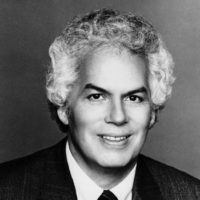
Stanley B. Prusiner
University of California, San Francisco
For the discovery of prions, a new class of infectious agents—opening the way to understanding baffling neurodegenerative diseases.
The identification of an entirely new class of disease-causing pathogens that appear to replicate without genes is one of the most revolutionary conceptual advances in medicine and opens a new era of biological research. To set forth what many scientists considered to be the heretical idea that the transmissible agent in several rare neurodegenerative diseases is a protein and not a slow-acting virus, as had been generally thought, required great scientific and personal courage.
In 1982, Stanley Prusiner proposed that the infectious agent causing scrapie, a disease of sheep, is a mysterious pathogen when he named the prion, for proteinaceous infectious particle.
From the brains of scrapie-infected animals, Dr. Prusiner purified the prion which appeared to be composed only of protein, yet it could multiply. He called this protein the "prion protein," or PrP. When he looked for a nucleic acid (DNA or RNA) in the prion, there was no evidence for one. But how could prions multiply without a genome? Subsequently, Dr. Prusiner and his colleagues found that the protein of the prion was derived from a normal protein which is encoded by a gene found in all animals examined, including humans.
Later, Dr. Prusiner and his colleagues found that the tempo of scrapie in animals was controlled by the sequence of PrP and that Gerstmann-Straussler-Scheinker disease in humans is caused by a mutation in the PrP gene. Genetically engineered, or transgenic mice harboring PrP genes with the human mutation spontaneously developed brain degeneration similar to scrapie. These studies argued that prion diseases can be both inherited and infectious, an unprecedented concept.
Unable to find a chemical difference that distinguished normal PrP from the disease form, Dr. Prusiner and his colleagues found that the two PrP forms have different shapes or conformations. The disease form of PrP appears to act as a template for the refolding of normal PrP into the disease form. Indeed, prion diseases seem to be disorders of protein conformation.
To Stanley Prusiner, for landmark, revolutionary work, conducted over 20 years—often in the face of skepticism and doubt—which established the existence of an entirely new class of infectious agents, and which opened new understanding of the pathogenesis of several baffling neurodegenerative diseases, this 1994 Albert Lasker Basic Medical Research Award is given.
